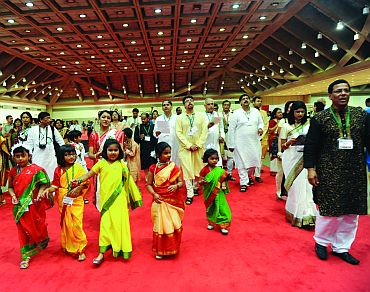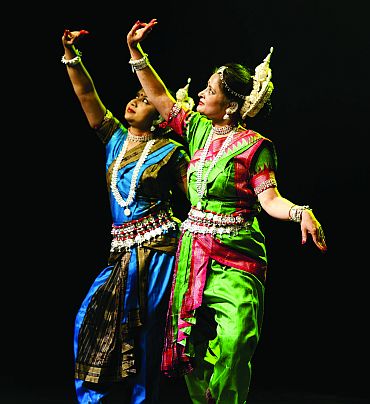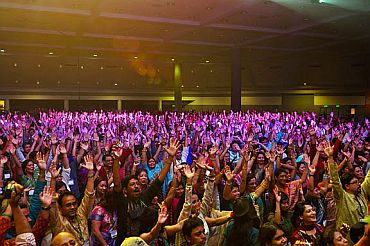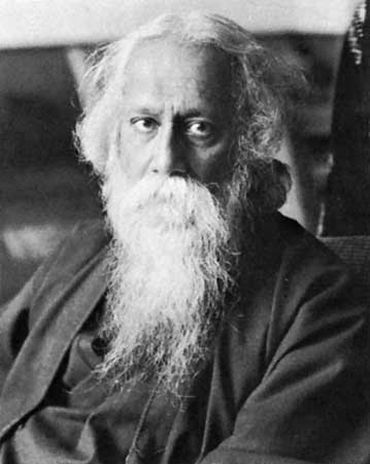
For three days during the July 4 weekend holidays in United States, the Baltimore Convention Centre in Maryland was transformed into a mini Kolkata.
An estimated 8,000 Bengalis from across the United States and around the globe flocked to the 31st North American Bengali Conference. The visitors came from India, Canada, Bangladesh, the Caribbean and even South America and Mexico.
 |
The seminars and discussions covered a range of topics, including the arts, culture, health, business and politics.
While there was also music and dance, these did not permeate the conference the way they did in previous years. The convention was also billed as a celebration of the 150th birth anniversary of Nobel Laureate Rabindranath Tagore.
Women in multicolored sarees and men in their dhoti-kurtas helped recreate a miniature Bengal, complete with Rabindra sangeet and an appreciation of Tagore's contributions to literature, poetry, dance, drama, history, arts and paintings.
...

The theme of this year's Bengali convention was Dekhi Banglar Mukh (See the Face of Bengal). A Prabhat Pheri (morning procession) with over 200 people including children in colorful outfits was a highlight, followed by a performance by Rabindra Bharati, a group of artists from Kolkata who performed Tagore's dance drama Kach-o-Debjani.
Singers from India, like Kumar Sanu, Alka Yagnik, Lopamuddra Mitra and Srikantha Acharya, also performed.
The convention was inaugurated by Maryland's Democratic Governor Martin O'Malley; Kumar Barve, the state's Democratic Majority Leader of the House of Delegates; Indian Ambassador Meera Shankar; Dr Rajan Natarajan, Maryland's new deputy secretary of state; Ike Leggett, Montgomery county executive; and Rama Saha, chairperson of the convention.
Dr Pradeep Ganguly, senior advisor to the Prince George's County Economic Advisory Council, was the emcee.
O'Malley, the first governor to visit a Bengali convention, mingled with the convention-goers, toured the exhibition hall, and read some of Tagore's poetry.
In his extempore remarks, he described the important role Bengali Americans play in the country's diversity and strength and discussed his plans to take a delegation to India this fall.
The visit comes after Maryland reopened a trade office in India.

Toby Chaudhuri, a second-generation community activist, who introduced O'Malley, quipped, "Governor O'Malley is the only governor to hold a Diwali puja at his home. The ceremony must have appeased some of our Gods because he's also the only governor to balance his budget, cut spending and increase investments in public education all at the same time in this economic climate."
Chaudhuri, who also organised and moderated a politics and business seminar featuring young, second-generation Indian Americans who have served in the Obama and Bush administrations, told India Abroad: "This is an extraordinary moment for our community. Emboldened by historic changes in Kolkata and Dhaka, Bengalis are on the rise. We're gaining strength and political sophistication. We're enjoying an expanded coalition with other Indian and Asian Americans and we're starting to see exciting new leaders. Officials like Amit Bose of Atlanta, Ronnie Chatterjee of Raleigh, Korok Timi Ray of Boston and Neil Chatterjee of Cincinnati -- all Bengalis and all from the top-levels of the Obama and Bush administrations and the US Senate -- discussed the issues at stake for our community. Pawan Dhingra, a curator from the Smithsonian Institution, discussed establishing a permanent exhibit at the nation's largest museum to tell the story of our people in America -- in a project called HomeSpun, he exhorted the community to contribute and support this project."
Chaudhuri continued: "We saw deep discussions about business and commerce, and an extraordinary new generation of Bengali youth who used the conference to define the community's direction. These meetings -- on the sidelines of the cultural feast we've come to expect at the conference -- showed how we have the power to transform the debate both within our community and across the country... Participants agreed to take the political discussion back to their communities and to compare notes when they meet for next year's Bengali conference in Las Vegas."

Ambassador Shankar spoke glowingly of the contributions made by Bengalis not only in the US, but also in India. She gave an overview of Bengal's contributions in India's political movement and freedom struggle and the huge contributions of Tagore to world literature, poetry and drama.
Leggett lauded the contributions of Indian Americans in Montgomery County, as well as the rest of the state in fostering India's rich culture.
Natarajan lauded contributions of longtime community activists like prominent Bengali Dr Sambhu N Banik for his services as commissioner in the Maryland Human Rights Commission; Hitabrata Roy, a senior member of the faculty of Shantiniketan and an authority on Tagore and Rabindra sangeet; and Saha, a State Department employee, for coordinating the three-day conference.
The participants also watched movies by Bengali directors including Anjan Datta, Sandip Roy, Raja Sen, Gautam Ghose and the drama productions of Gautam Halder, Debshankar Halder and Dyuti Ghosh.
There were dance recitals, reunions and alumni get togethers of universities across the state.
A seminar on political involvement over the years by Indian Americans was chaired and moderated by Banik and featured, Barve, Maryland Delegate Sam Arora, Dr Joy Cherian, the first sub-cabinet level appointee in a US administration who served as President Ronald Reagan's commissioner of the Equal Employment Opportunity Commission, and Dr Rajen Anand, a senior official in the Obama administration who is a director of nutrition in the Department of Agriculture.
Dr Prabhati Ray along with her husband Dr Radharaman Ray organised a Scientific Research Seminar and Dr Kadan Sau gave public demonstrations of medical procedures.
Chaudhuri also organised a seminar on the Bengali movement in the US. Srimati Kamala, former director of the Gandhi Center, gave a scintillating sitar recital and was also presented with an award for spreading the philosophy of love and peace of Mahatma Gandhi in Washington, DC through the Lotus Temple she founded in New Delhi.

Swadesh Chatterjee, the winner of the third-highest Indian civilian honour the Padma Bhushan, for helping mobilise the Indian-American community to push through the US-India civilian nuclear deal, highlighted the political and economic accomplishments of the Indian-American community.
Chatterjee, also the winner of the first India Abroad Award for Service to the Community in 2007, spoke of how the economic reforms in India in the early 1990s largely passed by the Bengalis.
"West Bengal slid from the preferred home of India's leading financial and business enterprises to a place near the bottom of the rankings," he said. As a result, he added, many of them came to the US and other western countries.
"Now," Chatterjee said, "with the rise of a Bengal government that recognises the power of markets and free enterprise to build economic prosperity, we, who are from Bengal, have new opportunities to engage with the land of our adopted home and the land of our ancestors. These opportunities are political as well as economic and will rebound to our own benefit and for the benefit of the US and India."
"We, Bengalis who have come to America, need to take advantage of the opportunities that this changed situation presents. First, we need to spread the message here that Bengal is re-emerging as a land of opportunity. We need to spread the message to our friends and relatives in Bengal that engagement with the United States through free and fair enterprise can bring great benefits to our people in India. Taking advantage of these opportunities will help Bengal return to its position of pre-eminence within India while driving US-India relations in a positive direction," he added.
He quoted Tagore: 'Do not say, "It is morning," and dismiss it with a name of yesterday. See it for the first time as a newborn child that has no name.'